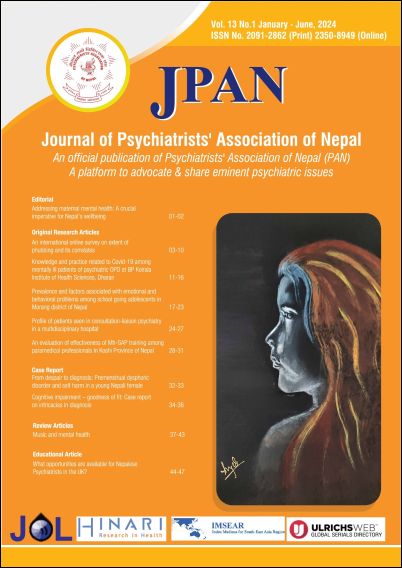An evaluation of effectiveness of Mh-GAP training among paramedical professionals in Koshi Province of Nepal
DOI:
https://doi.org/10.3126/jpan.v13i1.68182Keywords:
Mental Health, mhGAP, Paramedical Professional, Mental Health GapAbstract
Introduction: Mental health disorders significantly contribute to the global burden of disease, especially in low- and middle-income countries (LMICs) like Nepal, where the treatment gap for mental health is substantial. The World Health Organization's (WHO) Mental Health Gap Action Programme (mhGAP) aims to bridge this gap by training non-specialist healthcare providers. This study evaluates the effectiveness of mhGAP training on the knowledge, attitudes, and practices of paramedical professionals in Koshi Province, Nepal, and its impact on patient outcomes.
Material: A pre-test and post-test study design was employed over six months involving 204 paramedical professionals who had not previously received mhGAP training. Participants underwent baseline assessments, followed by mhGAP training, and post-training evaluations. Data were collected using a self-designed proforma and structured questionnaires and analyzed using paired t-tests and regression analysis.
Results: The mean post-test scores (21.68) were significantly higher than pre-test scores (19.70), indicating an improvement in knowledge and skills post-training (p < 0.000). A high correlation (0.888) between pre- and post-test scores suggests consistent improvement across participants. Regression analysis showed pre-test scores as a strong predictor of post-test performance (R² = 0.789).
Conclusion: The mhGAP training program significantly enhances the capacity of paramedical professionals to deliver mental health care in Koshi Province. This study provides evidence supporting the expansion of mhGAP training to other regions and highlights the need for systemic support to sustain these improvements. By improving knowledge, attitudes, and practices, mhGAP training can play a crucial role in bridging the mental health treatment gap in resource-limited settings.
Downloads
Downloads
Published
How to Cite
Issue
Section
License
Copyright (c) 2024 Journal of Psychiatrists' Association of Nepal

This work is licensed under a Creative Commons Attribution 4.0 International License.
This license enables reusers to distribute, remix, adapt, and build upon the material in any medium or format, so long as attribution is given to the creator. The license allows for commercial use.




